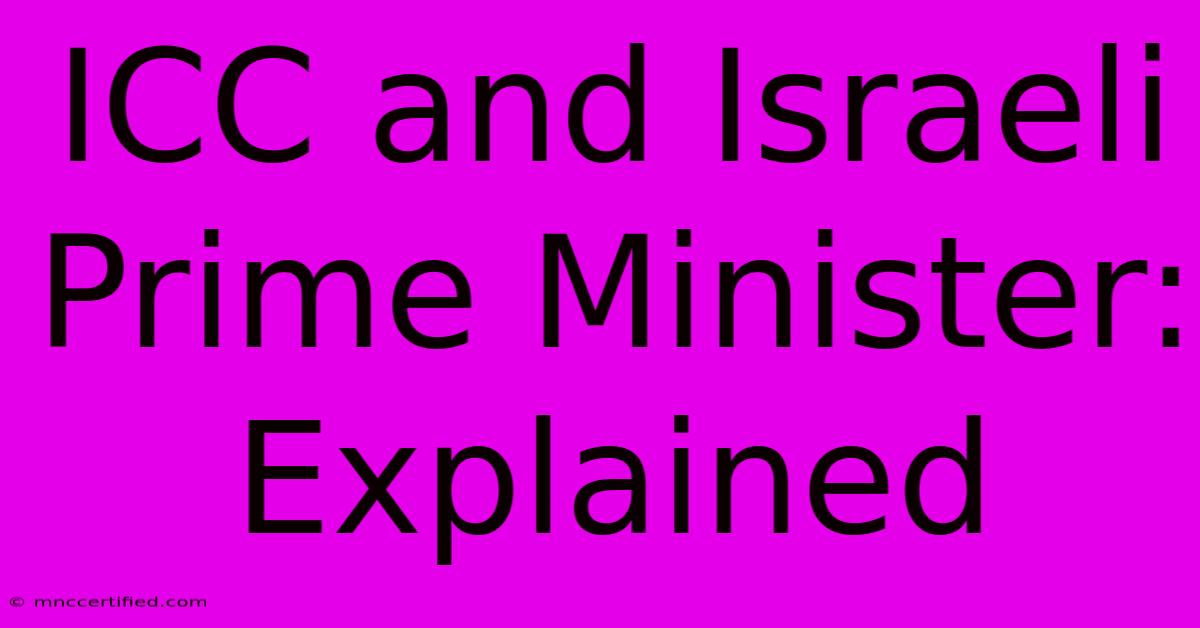ICC And Israeli Prime Minister: Explained

Table of Contents
ICC and Israeli Prime Minister: Explained
The relationship between the International Criminal Court (ICC) and Israeli Prime Ministers is complex and often fraught with tension. Understanding this requires examining the ICC's mandate, Israel's position, and the specific circumstances surrounding investigations and potential prosecutions.
What is the International Criminal Court (ICC)?
The ICC is an independent, permanent court established to prosecute individuals for the most serious crimes of international concern, namely genocide, crimes against humanity, war crimes, and the crime of aggression. It's crucial to understand that the ICC only prosecutes individuals, not states themselves. Its jurisdiction is triggered under specific circumstances, often involving state consent or referral by the UN Security Council. However, the court also has a mechanism for investigating situations where states haven't cooperated.
Key aspects of the ICC:
- Limited Jurisdiction: The ICC doesn't have universal jurisdiction. It only prosecutes crimes committed on the territory of a state party or by a national of a state party, unless the UN Security Council refers a situation.
- Principle of Complementarity: The ICC is meant to complement national jurisdictions. It only steps in if national courts are unwilling or unable genuinely to investigate and prosecute.
- Independent and Impartial: The court strives for independence and impartiality in its investigations and prosecutions.
Israel's Stance on the ICC
Israel is not a member of the Rome Statute, the treaty that established the ICC. Therefore, it doesn't recognize the court's jurisdiction over its citizens or actions within its territory. This position stems from several factors, including concerns about potential political bias and the perception that the ICC disproportionately targets Israel.
Israel's arguments often include:
- Bias and Anti-Israel sentiment: Israel argues the ICC is unfairly focused on its actions, neglecting similar alleged crimes committed by other countries. They view investigations as politically motivated.
- Self-defense: Israel contends that many of its actions in the Occupied Palestinian Territories are justified as measures of self-defense against attacks.
- National Sovereignty: Israel emphasizes its right to self-determination and rejects external interference in its internal affairs.
ICC Investigations and Israeli Prime Ministers
The ICC's investigations relating to the Israeli-Palestinian conflict have led to significant friction. While no Israeli Prime Minister has been directly indicted by the ICC, investigations have been launched into alleged crimes committed in the Occupied Palestinian Territories. This has created a situation where Israeli leaders face potential legal ramifications for actions taken during their tenure. This uncertainty significantly impacts Israeli foreign policy and domestic politics.
Potential consequences for Israeli Prime Ministers:
- International Arrest Warrants: If the ICC finds sufficient evidence, arrest warrants could be issued for Israeli officials, potentially impacting their international travel and diplomatic relations.
- Legal Challenges: Any indictment would likely lead to protracted legal battles and challenges to the court's jurisdiction.
- Domestic Political Fallout: The investigations and potential prosecutions can severely impact public opinion and domestic political stability within Israel.
Future Implications
The relationship between the ICC and future Israeli Prime Ministers remains highly uncertain. The ongoing investigations and potential future ones highlight the complex interplay between international law, national sovereignty, and the pursuit of justice in conflict zones. Understanding this dynamic requires a nuanced approach, considering the legal arguments, political realities, and potential consequences for all parties involved. The situation underscores the ongoing debate surrounding the ICC's role in addressing international crimes and the challenges of applying international law in highly contested geopolitical contexts.
Keywords: ICC, International Criminal Court, Israeli Prime Minister, Rome Statute, Palestine, Occupied Palestinian Territories, War Crimes, Crimes Against Humanity, Genocide, International Law, Jurisdiction, Investigation, Indictment, Political Implications, Legal Challenges, Self-Defense.

Thank you for visiting our website wich cover about ICC And Israeli Prime Minister: Explained. We hope the information provided has been useful to you. Feel free to contact us if you have any questions or need further assistance. See you next time and dont miss to bookmark.
Featured Posts
-
Ellen And Portia Reportedly Flee Us
Nov 22, 2024
-
I M A Celeb Stars Huge Earnings
Nov 22, 2024
-
Waynes Apology Coleen Rooneys Response
Nov 22, 2024
-
Todays Nfl Game Steelers Vs Browns Channel
Nov 22, 2024
-
Labour Giant Prescott Blair Pays Tribute
Nov 22, 2024